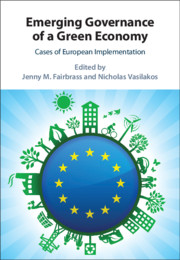Book contents
- Emerging Governance of a Green Economy
- Emerging Governance of a Green Economy
- Copyright page
- Contents
- Figures and Tables
- Contributors
- Preface
- Book Synopsis
- Acknowledgements
- Abbreviations
- 1 The Green Economy
- 2 The Green Economy
- 3 The Green Economy as Good Governance
- 4 On the Verge of a Second Revolution in the European Union’s Utilities Market for Energy Production?
- 5 ‘Great Expectations’
- 6 Overcoming Structural Disadvantages with Local Green Economies?
- 7 Shifting Models of Energy Companies towards Green Economy in Europe
- 8 Carbon Calculation and the Urban Green Economic Opportunity
- 9 The Green Economy
- Index
- References
4 - On the Verge of a Second Revolution in the European Union’s Utilities Market for Energy Production?
The Role of Social Enterprises
Published online by Cambridge University Press: 20 January 2021
- Emerging Governance of a Green Economy
- Emerging Governance of a Green Economy
- Copyright page
- Contents
- Figures and Tables
- Contributors
- Preface
- Book Synopsis
- Acknowledgements
- Abbreviations
- 1 The Green Economy
- 2 The Green Economy
- 3 The Green Economy as Good Governance
- 4 On the Verge of a Second Revolution in the European Union’s Utilities Market for Energy Production?
- 5 ‘Great Expectations’
- 6 Overcoming Structural Disadvantages with Local Green Economies?
- 7 Shifting Models of Energy Companies towards Green Economy in Europe
- 8 Carbon Calculation and the Urban Green Economic Opportunity
- 9 The Green Economy
- Index
- References
Summary
This chapter explores a possible change in the ownership structure of energy utilities through the introduction of social enterprises. This seems to be a pertinent approach, because in parallel to the EU 2020 strategy, the EU has introduced a Social Business Initiative (SBI). The authors of this chapter believe that the combination of both policies can change the ground rules of energy production and provision within the EU, which will be analysed in this chapter in relation to EU policies on renewable energy and social enterprises and their connection to international, national, and sub-national energy providers. The theoretical approach used for this analysis will be Multilevel Governance (MLG) because various actors need to be taken into account to arrive at an understanding of the governance of the energy sector, namely national governments and energy producers. Since the liberalisation of the European internal electricity market, the EU has also become a major actor in the energy sector. New small and medium energy producers are breaking into the European energy market. This multitude of actors prompts the choice of the governance approach. MLG is the most pertinent approach for this analysis because it considers the relationships between government, business, and ‘civil society’. The argument is that, together, these actors produce public policy. More specifically for the EU, MLG accounts for the European reality that international (above the EU), regional (EU institutions), national, and sub-national actors all influence the European energy policy. In this chapter, we focus on the normative objective function of social enterprises and how these fit in with the Inclusive Growth Strategy of Europe 2020.
- Type
- Chapter
- Information
- Emerging Governance of a Green EconomyCases of European Implementation, pp. 54 - 73Publisher: Cambridge University PressPrint publication year: 2021

